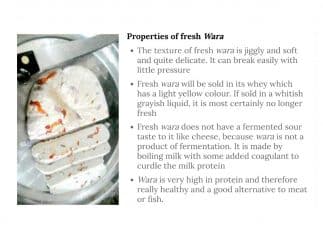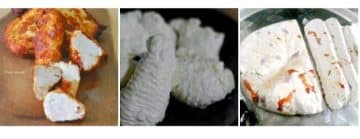Wara is a popular food item in the Northern part of Nigeria and is considered a meat alternative over there.
Wara has basically coagulated milk curds, its kinda like cheese but isn’t, if you are conversant with tofu from China, it is basically tofu.
Today we are going to be looking at the nutritional benefits of Wara and cow milk. Although their nutrients are the same since Wara came from milk
Benefits of eating Wara/Milk

The main component of wara is the milk protein known as casein, which gives the product its white colour. This makes wara really high in beneficial protein (usually 10-12%) which varies by the quality of milk and the amount of coagulant used.
It is an established fact that milk proteins contain amino acids essential for the correct functioning of the human body. Milk curds such as wara also have quite high levels of methionine, an irreplaceable amino acid that, among other things, protects the liver against becoming fat.
Wara protein is easily digested and absorbed by the body and is a great source of RDA protein intake. They are also an excellent substitute for meat.
Benefits Bone Health
Drinking milk has long been associated with healthy bones and it is one of the nutritional health benefits of Wara.
This is due to its powerful combination of nutrients, including calcium, phosphorus, potassium, protein and (in grass-fed, full-fat dairy) vitamin K2. All of these nutrients are essential for maintaining strong, healthy bones.
Approximately 99% of your body’s calcium is stored in your bones and teeth. Milk is an excellent source of the nutrients your body relies on to properly absorb calcium, including vitamin D, vitamin K, phosphorus, and magnesium.
Adding milk and dairy products to your diet may prevent bone diseases like osteoporosis. Studies have linked milk and dairy to a lower risk of osteoporosis and fractures, especially in older adults.
What’s more, milk is a good source of protein, a key nutrient for bone health. In fact, protein makes up about 50% of bone volume and around one-third of bone mass.
Evidence suggests that eating more protein may protect against bone loss, especially in women who do not consume enough dietary calcium. This is a health benefit of Wara that you should really exploit.

Helps Prevent Weight Gain
Another health benefit of Wara and Cow milk is that it helps prevent weight gain. Several studies have linked milk intake to a lower risk of obesity.
A study in 145 three-year-old Latino children found that higher milk-fat consumption was associated with a lower risk of childhood obesity
Another study including over 18,000 middle-aged and elderly women showed that eating more high-fat dairy products was associated with less weight gain and a lower risk of obesity
Milk contains a variety of components that may contribute to weight loss and prevent weight gain. For example, its high-protein content helps you feel full for a longer period of time, which may prevent overeating.
Furthermore, the conjugated linoleic acid in milk has been studied for its ability to boost weight loss by promoting fat breakdown and inhibiting fat production. Additionally, many studies have associated diets rich in calcium with a lower risk of obesity. Evidence suggests that people with a higher intake of dietary calcium have a lower risk of being overweight or obese.
Studies have shown that high levels of dietary calcium promote fat breakdown and inhibit fat absorption in the body. It is one of the health benefits of Wara and cow milk.
Milk Is a Versatile Ingredient
Milk is a nutritious beverage that provides a number of health benefits.
Moreover, it’s a versatile ingredient that can be easily added to your diet.
Aside from drinking milk, try these ideas for incorporating it into your daily routine:
- Smoothies: It makes an excellent, high-protein base for healthy smoothies. Try combining it with greens and a small amount of fruit for a nutritious snack.
- Oatmeal: It provides a tasty, more nutritious alternative to water when making your morning oatmeal or hot cereal.
- Coffee: Adding it to your morning coffee or tea will give your beverage a boost of beneficial nutrients.
If you’re not a fan of milk, there are other dairy products that have similar nutrient profiles.
For example, unsweetened yoghurt made from milk contains the same amount of protein, calcium, and phosphorus.
Yoghurt is a healthy and versatile alternative to processed dips and toppings.
Interested in making Wara? Below is a typical Nigerian Wara recipe:
Ingredients
1. 3 cups of soybeans or cow milk
2. 75ml cup freshly squeezed lime juice or apple cider vinegar, magnesium chloride, Epsom salt or calcium sulphate.
3. Water
4. Salt and pepper to taste (if you want)
5. Oil for frying
Direction
- Soak the soybeans overnight. Drain and grind in a blender ( add about 3 cups of water while grinding). If using fresh cow milk, you are good to go!
- Strain soybeans through a cheesecloth or sieve. Make sure you get the clothing kind.
- Pour the sieved milk into a big Pot, Boil the soy-milk or cows milk on medium heat for 45 minutes to 1 hour, stirring frequently.
- Reduce the heat, add in the lime juice (do not stir), tofu should start to form. Turn off the heat, cover the pot, set aside for 1 hour.
- Place the sieve in a bowl or over the sink, pour the tofu in carefully, fold the cheesecloth over and press out as much milk as possible.
- Press down on the sieve with a tray and a heavy object (this is to remove all excess water from the tofu and allow it to set)
- Leave for 4-5 hrs. Your tofu should be set and ready to serve fresh.
To fry: Cut the tofu into desired sizes and season with some salt, condiments and pepper. Deep fry until golden brown.


